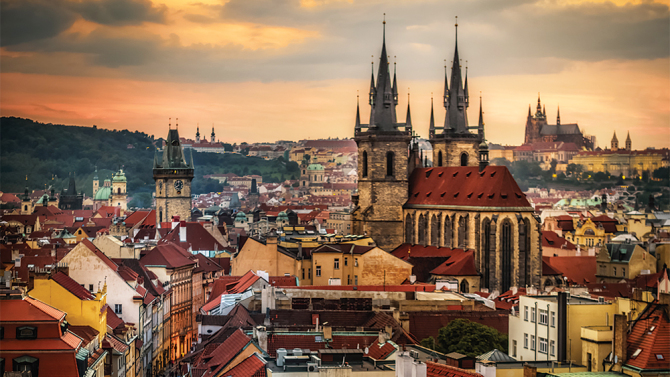
Thanks to generous incentives, the Czech capital - and the entire country - are drawing multiple foreign film and TV projects / © Prague City Tourism
With a steady stream of ambitious small-screen productions rolling in, and two major recent features recently wrapped and more on the way — all chasing incentives, talented artisans, and experienced crews — Prague and the Czech Republic have upped the ante in the competitive arena of Central Europe.
Although most countries of the former Eastern Bloc are vying for business, the Czechs are out to prove they are serious and reliable partners on international shoots — a point stressed by the first-ever visit to Hollywood by the country’s prime minister last April.
On his trip, Bohuslav Sobotka trumpeted tweaks that have made the Czech Republic’s 20% cash-back production incentives as user-friendly as anyone’s. The program has undergone continuous streamlining since its launch in 2010, and applications to the Czech Cinematography Fund are now accepted year-round.
Recent projects ranging from war drama Mountains and Stones, to Jessica Chastain-starrer The Zookeeper’s Wife, and Underworld 5 have underscored the core value that U.S. and Western European producers have known about for years: a phenomenal reputation for production design, modern infrastructure, and remarkably capable, affordable crews.
The creative tradition, for its part, dates back to the days of Art Nouveau championed by Bohemian artist Alfons Mucha, and Czech crafts folk can easily transform a Barrandov Studios soundstage into a post-apocalyptic fantasy.
They’re equally adept at time travel, creating World War II settings almost overnight from Czech forest locales and disused factories. Baroque period pieces remain a natural fit for Prague and environs as producers regularly find that entire authentic palaces can be had for less than the time and money needed to build an equivalent set.
The crown jewels — Prague’s Colloredo-Mansfeld Palace, the Charles Bridge, and the Nostic Theater — were dressed in 1787 finery for the recent U.K.-Czech production Interlude in Prague — which also made use of the towns of Cesky Krumlov, Libochovice, Ploskovice, Jemniste, and Doksany — to convey the story of Mozart’s work on his operatic masterpiece “Don Giovanni,” which he composed in Prague.
Authenticity and affordability are certainly selling points that Czech regional film offices make as they compete for the title of most film-friendly province, a kudo given out by the Czech Film Commission this year to Karlovy Vary.
Karlovy Vary mayor Petr Kulhanek is keenly interested in attracting new work. “We surely strive for more and strongly welcome state incentives,” he says.
The three-year-old Regional Film Office there is actively improving access and resources, both financial and in kind, adds Petr Zidlicky of the Karlovy Vary Department of Culture.
Things were not always this way, says Czech Film Commission topper Ludmila Claussova, who has embarked on an ambitious road show to enlist the help of other authorities and created a prize for the most film-friendly region.
In the Czech capital, meanwhile, even political controversy has been turned to advantage. Prague political watchdogs have expressed skepticism over the appointment of Czech media maven Andrej Babis as of finance minister in 2014 — but local production companies point out that business-friendly Babis is the most committed national policy leader in memory when it comes to attracting foreign production dollars – and that he understands the value of film incentives.
Babis has told industry types that he is working on increasing the 20% Czech cash-back incentive .
Prague post houses, meanwhile, have won over legions of foreign producers with advanced facilities and impressive effects. Industry leader UPP, usually working with Soundsquare, and veteran Prague company IO Post are booked year-round, putting polish on productions that see no reason to send their dailies back home after shooting.
The latter shingle, founded in 2005 when it worked with Czech New Wave director Jan Nemec on Toyen, has gone on to burnish the look of 45 features, usually as a co-producer.
Others winning market share in Prague are Bystrouska, Virtual Post and Barrandov Sound Music Studio. This area is another Czech forte, as shown by the regular film soundtrack bookings by all the major Czech orchestras.